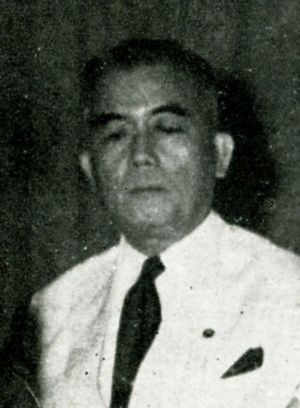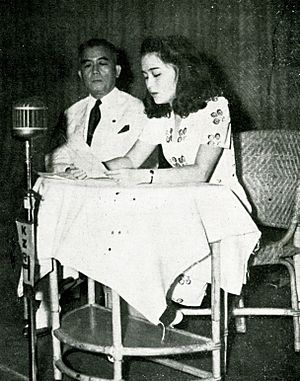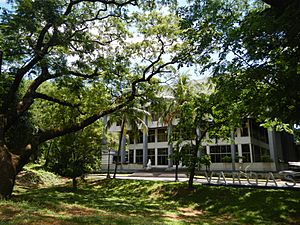Jorge B. Vargas facts for kids
Quick facts for kids
Jorge B. Vargas
|
|
|---|---|

Vargas and his daughter
|
|
| Prime Minister (de facto) | |
| In office October 14, 1943 – August 17, 1945 |
|
| President | José P. Laurel |
| Preceded by | Pedro A. Paterno (as Prime Minister) |
| Succeeded by | Ferdinand E. Marcos (as Prime Minister) |
| Presiding Officer of the Philippine Executive Commission | |
| In office January 23, 1942 – October 14, 1943 |
|
| Governor-General | Masaharu Homma Shizuichi Tanaka Shigenori Kuroda |
| Preceded by | Himself As Head of the Civilian Emergency Administration |
| Succeeded by | José P. Laurel (as President) |
| Head of the Civilian Emergency Administration In concurrent capacity with the mayoralty of Manila |
|
| In office December 22, 1941 – January 23, 1942 |
|
| Appointed by | Manuel Quezon |
| Succeeded by | Himself As Presiding Officer of the Philippine Executive Commission |
| 1st Mayor of the City of Greater Manila (11th Mayor of Manila) |
|
| In office December 24, 1941 – January 26, 1942 |
|
| Appointed by | Manuel Quezon |
| Vice Mayor | Hermenegildo Atienza (as Vice Mayor for Manila) |
| Preceded by | Position established (City of Greater Manila) Juan Nolasco (as Mayor of Manila) |
| Succeeded by | Leon Guinto, Sr. |
| Secretary of National Defense | |
| In office December 11, 1941 – December 22, 1941 |
|
| Appointed by | Manuel Quezon |
| Preceded by | Manuel Quezon in concurrent capacity as President |
| Succeeded by | Basilio Valdez |
| 1st Executive Secretary of the Philippines | |
| In office January 30, 1936 – December 11, 1941 |
|
| Appointed by | Manuel Quezon |
| Preceded by | Post created |
| Succeeded by | Manuel Roxas |
| 6th Vice Mayor of Manila | |
| In office January 1, 1932 – January 4, 1940 |
|
| Appointed by | Manuel Quezon |
| Mayor | Tomas Earnshaw (1932-1933) Juan Posadas Jr. (1934-1940) |
| Preceded by | Juan Posadas, Jr. |
| Succeeded by | Carmen Planas |
| Director General of the Philippine Carnival Association | |
| In office 1921–1922 |
|
| Preceded by | Vicente Morente |
| Succeeded by | Arsenio Luz |
| Personal details | |
| Born |
Jorge Bartolomé Vargas y Celis
August 24, 1890 Bago, Negros Occidental, Captaincy General of the Philippines |
| Died | February 22, 1980 (aged 89) Manila, Philippines |
| Political party | Nacionalista |
| Other political affiliations |
KALIBAPI (1942–1945) |
| Spouses | Marina Yulo Adelaida Montilla Peña |
| Children | 8 |
| Parents | Ángel Tiongco Vargas (father) Filomena Trinidad Celis (mother) |
| Alma mater | University of the Philippines Diliman (BA, LL.B) |
Jorge Bartolomé Vargas y Celis (born August 24, 1890 – died February 22, 1980) was an important Filipino lawyer and diplomat. He was also a strong supporter of youth programs. He was born in Bago, Negros Occidental, Philippines.
Vargas was a very bright student. He finished high school as the top student in 1909. He earned a Bachelor of Arts degree in 1911. Later, he received a Bachelor of Law degree with honors in 1914. Both of these degrees were from the University of the Philippines. He was also a founding member of the Philippine Amateur Athletic Federation in 1911. This group is now known as the Philippine Olympic Committee. He served as its second chairman from 1935 to 1955. He was also the first Filipino to become a member of the International Olympic Committee.
Contents
Early Life and Education
Jorge B. Vargas was born on August 24, 1890. His hometown was Bago, Negros Occidental, in the Philippines. He showed great promise from a young age. He was the valedictorian of his high school class in 1909. This means he was the top student. He then went on to study at the University of the Philippines. He earned his Bachelor of Arts degree in 1911. After that, he completed his Bachelor of Law degree with honors in 1914.
Serving the Government
After becoming a lawyer in 1914, Vargas began his career in government. He started as a law clerk for the Philippine Commission in 1915. He quickly moved up and became the chief clerk of the Department of the Interior in 1917.
In 1918, he worked as a legislative secretary. He assisted Speaker Sergio Osmeña of the House of Representatives. This role helped him understand how laws were made.
President Manuel L. Quezon appointed Vargas as his executive secretary in 1936. This was a new and important position in the country. Vargas was the very first person to hold this role.
When the Japanese forces arrived in the Philippines in 1941, Vargas was given a big responsibility. He was made the secretary of the Department of National Defense. A few weeks later, President Quezon appointed him as the mayor of the City of Greater Manila. His job was to manage the city when the Japanese army arrived on January 2, 1942.
In 1942, Vargas became the chairman of the Philippine Executive Commission. This group was set up by the Japanese. During this time, he was asked to become the President, but he said no. Instead, he served as the country's Ambassador to Japan. After the war, Vargas continued to serve the country. He was chairman of the National Planning Commission from 1946 to 1954. He also served on the Board of Regents for the University of the Philippines. In 1960, the Philippines honored him with the Philippine Legion of Honor. This is a very high award.
A Leader in Scouting
Jorge Vargas was deeply involved in the Scouting movement. His connection to Scouting began in 1935. He joined the executive board of the Philippine Council of the Boy Scouts of America. Along with other people who supported Scouting in the Philippines, he helped create the Boy Scouts of the Philippines in 1936. He was one of its first members.
After Manuel Camus passed away in 1949, Vargas was chosen to lead the Boy Scouts of the Philippines. He became both the president and chief scout. He held the position of national president until 1961. He also became a member of the World Scout Committee from 1951 to 1957. This committee is part of the World Organization of the Scout Movement.
Vargas received many awards for his work in Scouting. In 1959, he was given the Bronze Wolf. This is the only award given by the World Organization of the Scout Movement. He also received awards from other countries. These included the Silver Tamaraw from the Philippines and the Silver Fox from Canada. He also got the Silver Ibex from Austria and the Silver Wolf from the UK. In 1959, he received the highest award from the Scout Association of Japan, called the Golden Pheasant Award. In 1961, he was the first person to receive the Tanglaw ng Kabataan (Light of the Youth) Award from the Boy Scouts of the Philippines.
Death
Jorge B. Vargas passed away on February 22, 1980. He was 89 years old when he died in Manila, Philippines.
Honours
 Japan: Grand Cordon (1st Class) of the Order of the Rising Sun (October 1, 1943)
Japan: Grand Cordon (1st Class) of the Order of the Rising Sun (October 1, 1943)
Gallery
See also
 In Spanish: Jorge B. Vargas para niños
In Spanish: Jorge B. Vargas para niños
- Jorge B. Vargas Museum and Filipiniana Research Center
 | Toni Morrison |
 | Barack Obama |
 | Martin Luther King Jr. |
 | Ralph Bunche |




